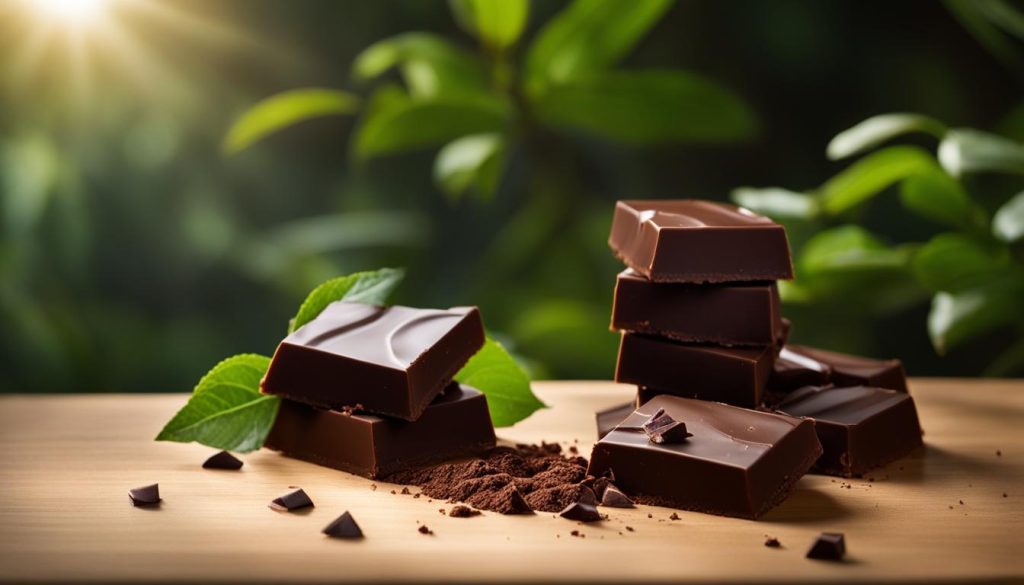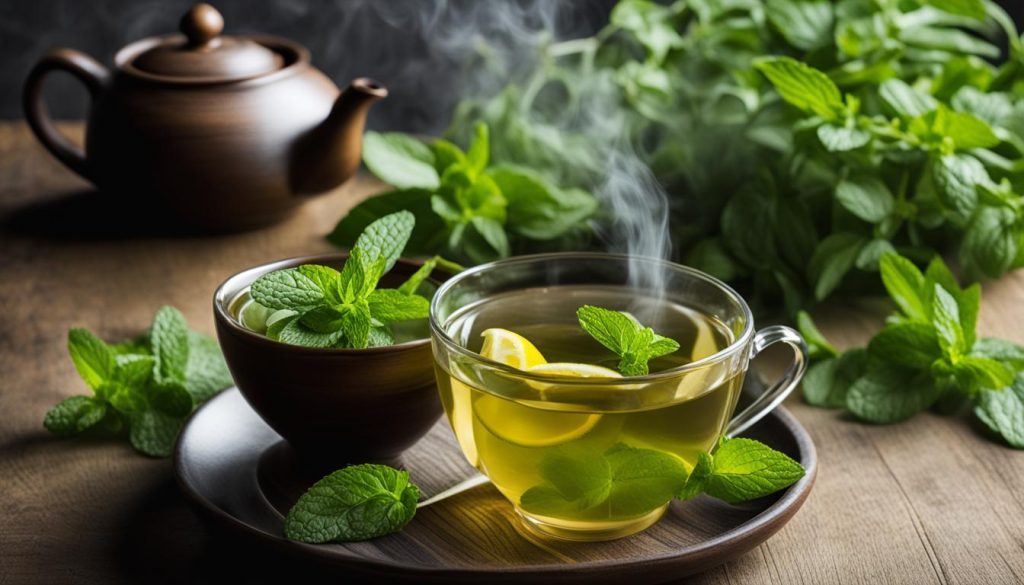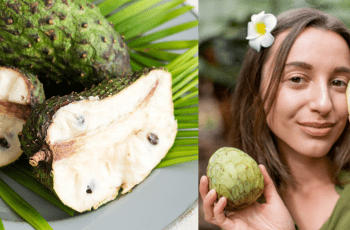Hello, I’m here to help you understand how diet plays a significant role in managing anxiety symptoms. When it comes to anxiety, what you eat can make a difference. Certain foods have been found to have calming and anxiety-reducing properties, thanks to their antioxidant, mineral, and vitamin content. On the other hand, it is important to be mindful of foods that can worsen stress and anxiety, such as those high in sugar and fat.
Key Takeaways:
- Managing anxiety through diet is possible and can be effective.
- Certain foods have anxiety-relieving properties, thanks to their nutrients.
- Avoid or limit foods high in sugar and fat, as they can worsen anxiety symptoms.
- Consult with a mental healthcare provider for personalized guidance on managing anxiety.
- Incorporating anxiety-relieving foods into your meals can contribute to anxiety relief.
Natural Remedies for Anxiety
Including specific foods in your diet can help alleviate anxiety symptoms. Avocados, eggs, oranges, blueberries, dairy products, dark leafy greens, cashews, chia seeds, pumpkin seeds, oysters, salmon, and turkey are all known to have anxiety-relieving properties. These foods are rich in nutrients such as B vitamins, magnesium, zinc, vitamin C, omega-3 fatty acids, and tryptophan, which support the nervous system, boost mood, reduce stress levels, and regulate neurotransmitters involved in anxiety.
Chamomile for Anxiety Relief
When it comes to finding natural remedies for anxiety, chamomile has been a popular choice for centuries. Known for its calming effects, chamomile is available in both tea and extract forms, making it convenient to incorporate into your daily routine.
Chamomile contains powerful antioxidants and anti-inflammatory properties that can help reduce inflammation associated with anxiety. By targeting inflammation, chamomile aids in creating a more relaxed state, which can be beneficial for those experiencing anxiety symptoms.
What sets chamomile apart is its potential to regulate neurotransmitters in the brain, such as serotonin, dopamine, and GABA. These neurotransmitters play a crucial role in mood regulation and stress response, making chamomile a valuable ally in managing anxiety.
Research studies have shown promising results for chamomile extract in reducing symptoms of generalized anxiety disorder (GAD) when consumed regularly. By incorporating chamomile tea or extract into your daily routine, you can potentially experience the calming effects and find relief from anxiety symptoms.
Adding a cup of chamomile tea to your evening routine or taking chamomile extract in supplement form are simple ways to embrace its anti-anxiety properties. However, it’s essential to consult with a healthcare professional before adding chamomile to your regimen, especially if you have any underlying medical conditions or are currently taking medications.
Turmeric for Anxiety Relief
When it comes to managing anxiety, turmeric may offer some relief. Turmeric is a spice that contains an active compound called curcumin, which has been extensively studied for its potential benefits in promoting brain health and reducing anxiety.
Curcumin is known for its antioxidant and anti-inflammatory properties, which can protect brain cells from damage and reduce chronic inflammation associated with anxiety. By reducing inflammation in the brain, curcumin may help improve overall mental well-being.
Studies have shown that curcumin supplementation can lead to lower anxiety scores and improved mood. Although more research is needed to fully understand the impact of turmeric on anxiety, incorporating it into your diet is worth considering.
To incorporate turmeric into your daily routine, you can add it to your meals or beverages. Sprinkle turmeric powder in your dishes, or try brewing a warm turmeric latte for a soothing and anxiety-relieving drink.
Remember, before making any significant changes to your diet or trying new supplements, it’s always a good idea to consult with a healthcare professional.
Dark Chocolate for Anxiety Relief
When it comes to finding natural remedies for anxiety, dark chocolate is a delicious option worth considering. Not only does it satisfy your sweet tooth, but it also contains flavonols that have been found to have positive effects on brain function and may help alleviate anxiety.
Flavonols, which act as antioxidants, promote blood flow to the brain, enhancing cell signaling pathways and supporting overall brain health. By boosting blood flow, dark chocolate can improve cognitive function and support the brain’s ability to regulate emotions.
Studies have shown that regular consumption of dark chocolate is associated with lower symptoms of depression, suggesting its potential to positively impact mood and mental well-being. However, it’s important to note that more research is needed to fully understand the long-term effects of dark chocolate on anxiety and mood.
To reap the potential benefits of dark chocolate, it’s essential to consume it in moderation. Dark chocolate is calorie-dense, so indulging in small portions is key to avoid excess calorie intake.

Include a square or two of dark chocolate in your diet as a delightful treat that not only satisfies your cravings but may also have a positive impact on anxiety and brain function. Just remember to enjoy it mindfully and in moderation.
Yogurt for Anxiety Relief
When it comes to managing anxiety, incorporating the right foods into your diet can make a significant difference. Yogurt, especially those containing probiotics, can play a beneficial role in supporting mental health and alleviating anxiety symptoms.
Probiotics are healthy bacteria that are found in certain foods and supplements. They can have a positive impact on the gut-brain axis, which is the pathway that connects the gut and the brain. Research suggests that a healthy gut microbiome, fostered by probiotics, is linked to improved mental health.
By consuming probiotic-rich foods like yogurt, you can reduce inflammation in the body and increase the production of mood-boosting neurotransmitters. This, in turn, can help improve overall well-being and alleviate anxiety symptoms.
Incorporating yogurt with live active cultures into your diet can be a simple and effective way to introduce probiotics and promote a healthy gut microbiome. It is important to choose yogurts that clearly state the presence of live active cultures on their labels.
Remember, everyone’s dietary needs are unique, and it is important to consult with a mental healthcare provider for personalized guidance on managing anxiety. But including yogurt with probiotics in your diet can be a delicious and easy step toward supporting your mental well-being.
Green Tea for Anxiety Relief
Green tea is known for its potential role in promoting brain health and alleviating anxiety. One of the key components in green tea is L-theanine, an amino acid that has been studied for its positive effects on anxiety and stress reduction.
L-theanine has been found to reduce subjective stress and cortisol levels, which can help promote relaxation and a sense of calm. It may also have a positive impact on neurotransmitters in the brain, such as GABA, dopamine, and serotonin, which are known to have anti-anxiety effects.
In addition to L-theanine, green tea contains another compound called EGCG, which is a powerful antioxidant. Antioxidants help protect the brain from oxidative stress and may contribute to reducing anxiety symptoms.

While more research is needed to fully understand the effects of green tea on anxiety, incorporating it into your diet can be a beneficial addition to support brain health and potentially alleviate anxiety symptoms.
Disclaimer: It’s important to note that while certain foods, like green tea, may have potential benefits for anxiety relief, they should not be used as a substitute for professional medical advice. If you are experiencing anxiety, it is always recommended to consult with a healthcare professional for proper diagnosis and personalized treatment.
Almonds and Blueberries for Anxiety Relief
When it comes to finding natural remedies for anxiety, incorporating certain foods into your diet can make a significant difference. Two powerful ingredients that have been shown to help alleviate anxiety symptoms are almonds and blueberries.
First, let’s talk about almonds. These small nuts are packed with essential nutrients, including vitamin E and healthy fats. Vitamin E is known for its antioxidant properties, which can help reduce oxidative stress in the brain and support overall brain function. Healthy fats, on the other hand, are crucial for maintaining optimal brain health and reducing inflammation.
In fact, studies have shown that increased consumption of nuts, including almonds, is associated with decreased symptoms of depression. So by adding a handful of almonds to your daily snack routine or including them in your meals, you can contribute to anxiety relief and improve your overall mental well-being.
Now, let’s move on to blueberries. These vibrant berries are not only delicious but also packed with antioxidants and vitamin C. Antioxidants play a crucial role in protecting the brain from free radicals and reducing inflammation, both of which are linked to anxiety. Vitamin C, on the other hand, has been shown to improve brain health and reduce symptoms of depression in some studies.
Adding blueberries to your diet can provide the brain with a strong dose of antioxidants and vitamin C, contributing to improved brain function and potentially reducing anxiety symptoms.
So whether you choose to snack on a handful of almonds or incorporate blueberries into your breakfast smoothie, these two ingredients can be powerful allies in your journey towards anxiety relief.
Incorporating almonds and blueberries into your diet can help support brain health, reduce oxidative stress, and provide essential nutrients that may alleviate anxiety symptoms. So why not make them a regular part of your meals and snacks? Stay tuned for the next section, where we’ll explore another natural remedy for anxiety.
Conclusion
Managing anxiety through diet is possible by incorporating anxiety-relieving foods into your meals. Foods like avocados, eggs, oranges, blueberries, dark leafy greens, salmon, and yogurt are packed with nutrients that support brain health, reduce inflammation, and regulate neurotransmitters involved in anxiety. These natural remedies can help promote mood stability and provide relief from anxiety.
It is essential to prioritize a diet that includes foods rich in vitamins, minerals, and antioxidants, while limiting the consumption of sugary and fatty foods that can worsen anxiety symptoms. Additionally, incorporating natural remedies like chamomile tea, turmeric, dark chocolate, and green tea can further aid in managing anxiety.
However, it is important to consult with a mental healthcare provider for personalized guidance in managing anxiety and to ensure an appropriate treatment plan. They can provide expert advice and support to help you develop a comprehensive approach that combines diet, natural remedies, and other therapeutic strategies to effectively manage anxiety and improve your overall well-being.
FAQ
What role does diet play in managing anxiety symptoms?
Diet plays a significant role in managing anxiety symptoms. Certain foods can help reduce anxiety quickly, thanks to their antioxidant, mineral, and vitamin content. On the other hand, it is important to avoid or limit the consumption of foods high in sugar and fat, as they can worsen stress and anxiety. It is advisable to seek guidance from a mental healthcare provider for proper management of anxiety symptoms.
What foods can help alleviate anxiety symptoms?
Including specific foods in your diet can help alleviate anxiety symptoms. Avocados, eggs, oranges, blueberries, dairy products, dark leafy greens, cashews, chia seeds, pumpkin seeds, oysters, salmon, and turkey are all known to have anxiety-relieving properties. These foods are rich in nutrients such as B vitamins, magnesium, zinc, vitamin C, omega-3 fatty acids, and tryptophan, which support the nervous system, boost mood, reduce stress levels, and regulate neurotransmitters involved in anxiety.
How can chamomile help with anxiety relief?
Chamomile, both in the form of tea and extract, is known for its calming effects on anxiety. It contains antioxidants and anti-inflammatory properties that help reduce inflammation associated with anxiety. Chamomile is believed to regulate neurotransmitters like serotonin, dopamine, and GABA, which are involved in mood regulation and stress response. Studies have shown that chamomile extract can significantly reduce symptoms of generalized anxiety disorder (GAD) when consumed regularly.
What role does turmeric play in anxiety relief?
Turmeric, a spice that contains curcumin, has been studied for its role in promoting brain health and reducing anxiety. Curcumin has antioxidant and anti-inflammatory properties that can protect brain cells from damage and reduce chronic inflammation associated with anxiety. Some studies have shown that curcumin supplementation can lead to lower anxiety scores and improved mood. More research is needed to fully understand the impact of turmeric on anxiety, but incorporating it into your diet is worth trying.
Can dark chocolate help with anxiety relief?
Dark chocolate, rich in flavonols, has been found to have positive effects on brain function and may help alleviate anxiety. Flavonols act as antioxidants and promote blood flow to the brain, enhancing cell signaling pathways. Some studies have shown that regular consumption of dark chocolate is associated with lower symptoms of depression. However, more research is needed to understand its long-term effects on anxiety and mood. It’s important to consume dark chocolate in moderation due to its high calorie content.
How does yogurt contribute to anxiety relief?
Yogurt, especially those containing probiotics, can have a positive impact on mental health and anxiety. Probiotics support the gut-brain axis, a system that connects the gut and the brain. Research suggests that a healthy gut microbiome is linked to better mental health. Probiotic foods like yogurt reduce inflammation, increase the production of mood-boosting neurotransmitters, and improve overall well-being. Incorporating yogurt with live active cultures into your diet can potentially help alleviate anxiety symptoms.
What are the effects of green tea on anxiety?
Green tea contains L-theanine, an amino acid that has been studied for its positive effects on brain health and anxiety. L-theanine can reduce subjective stress and cortisol levels, promoting relaxation. It may also increase GABA, dopamine, and serotonin in the brain, neurotransmitters with anti-anxiety effects. Green tea also contains the antioxidant EGCG, which may further assist in reducing anxiety. More research is needed to fully understand the impact of green tea on anxiety, but it can be a beneficial addition to the diet.
How can almonds and blueberries help with anxiety relief?
Almonds are a great source of vitamin E and healthy fats, both of which support brain function and reduce oxidative stress associated with anxiety. Some studies have shown that increased nut consumption is associated with decreased symptoms of depression. Blueberries, on the other hand, are high in antioxidants and vitamin C, which have been linked to improved brain health and reduced symptoms of depression in some studies. Incorporating almonds and blueberries into your diet can contribute to anxiety relief.
Can managing anxiety through diet be effective?
Managing anxiety through diet is possible by incorporating anxiety-relieving foods into your meals. Avocados, eggs, oranges, blueberries, dairy products, dark leafy greens, cashews, chia seeds, pumpkin seeds, oysters, salmon, turkey, chamomile tea, turmeric, dark chocolate, yogurt, green tea, almonds, and blueberries are all potential sources of relief. These foods contain nutrients and compounds that support brain health, reduce inflammation, regulate neurotransmitters, and promote mood stability. It’s important to avoid or limit foods high in sugar and fat, as they can worsen anxiety symptoms. Consult with a mental healthcare provider for personalized guidance in managing anxiety.




